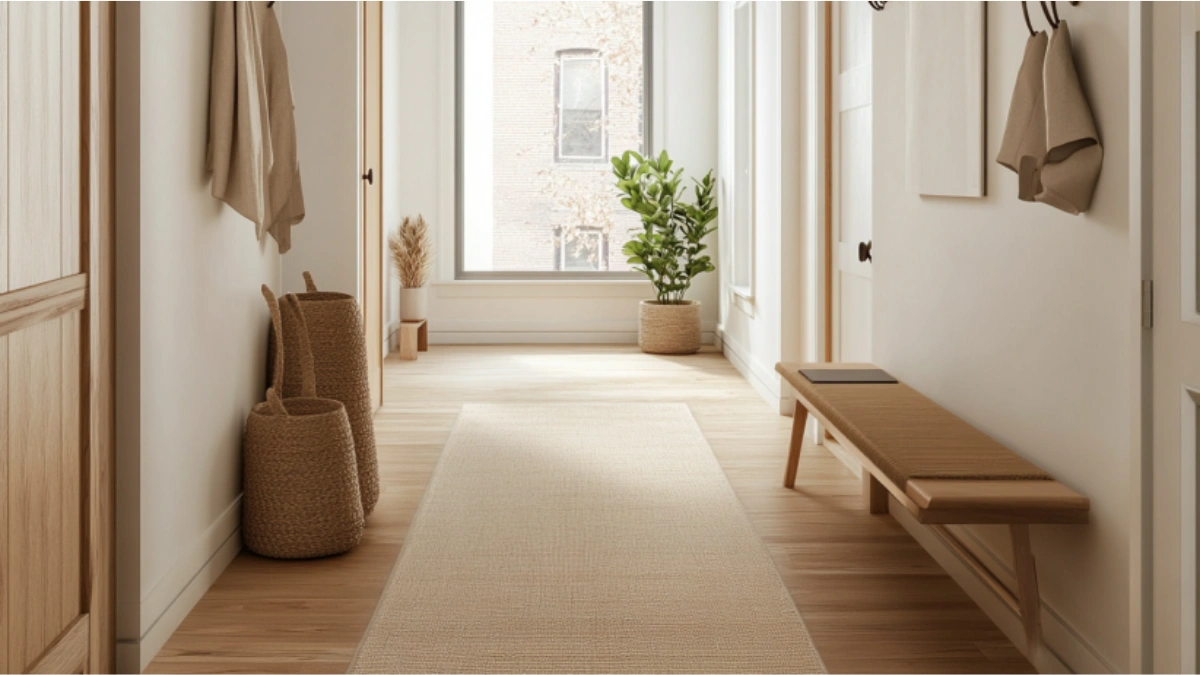Small Entryway Rug Ideas for Compact Spaces That Elevate Style and Function
Table of Contents
A small entryway sets the tone for your entire home—and yet it’s often the most overlooked space in terms of decor. According to a 2024 home design report by Houzz, 72% of homeowners feel that the entryway is critical for creating a welcoming atmosphere, even in tight quarters. One simple upgrade that can make a significant difference? The right rug.
In a compact space, the rug you choose does more than provide a cozy welcome. It helps define zones, add personality, trap dirt, and soften hard surfaces—all while tying your aesthetic together. Whether you prefer boho textures, classic neutrals, or modern geometrics, there’s a perfect rug to suit your entryway style and layout.
This blog post will walk you through everything from choosing the right size and shape to selecting patterns, materials, and layering techniques that make your small space feel intentional, stylish, and functional. We’ll also break down maintenance tips, seasonal swaps, and visual guides to help you make the most of every square foot.
Choosing the Right Rug Size for a Small Entryway
When it comes to small spaces, size isn’t just a detail—it’s everything. An entry rug that’s too big can overwhelm the area, while one that’s too small can look like an afterthought.
Standard Rug Sizes for Entryways
| Entryway Type | Recommended Rug Size | Notes |
| Single Door Entry | 2′ x 3′ or 3′ x 5′ | Ideal for narrow walk-ins |
| Apartment Entry Hall | 2.5′ x 7′ runner | Creates a linear path |
| Mudroom Transition | 3′ x 5′ or 4′ round | Good balance between function & style |
Pro Tip: Leave at least 6 inches of space between the rug and the wall to keep things visually tidy.
A runner rug works wonders for long, narrow entry halls. In contrast, a rectangular or oval rug anchors square foyers. Always measure the door swing—nothing ruins function faster than a rug bunched under a door.
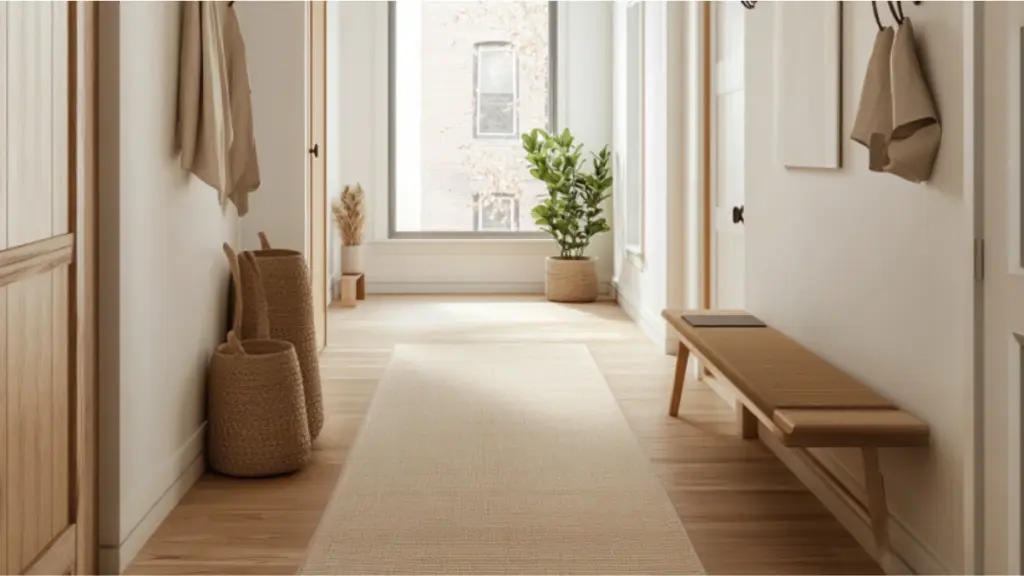
Best Rug Materials for High-Traffic Entryways
Entryways demand durability. This space is the frontline for dirt, moisture, and frequent foot traffic. Choosing the right material ensures your rug stays beautiful and functional longer.
Comparison of Rug Materials
| Material | Pros | Cons |
| Wool | Soft, durable, natural | Pricey and needs occasional cleaning |
| Jute | Earthy texture, sustainable | Can be rough, not moisture-friendly |
| Polypropylene | Stain-resistant, budget-friendly | Less luxe, synthetic feel |
| Cotton | Lightweight, washable | Less durable in heavy traffic zones |
For entryways that see rain, mud, and pets, polypropylene rugs are a go-to. Wool offers timeless beauty and warmth but comes at a higher cost and requires more care. Jute and sisal lend a rustic charm and suit farmhouse or coastal aesthetics, though they’re best kept dry.
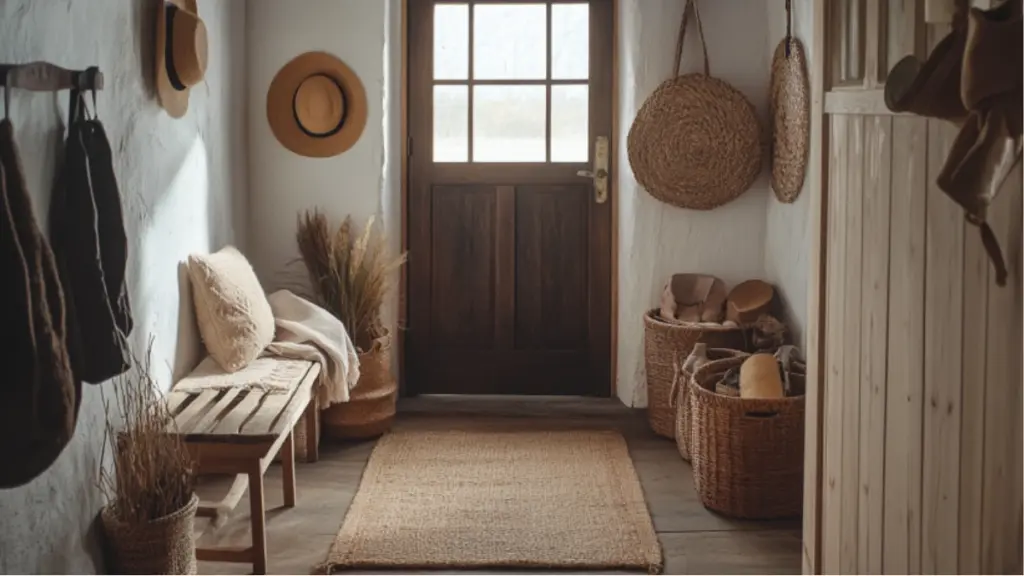
Stylish Patterns That Work in Compact Spaces
Patterns can define a small entryway rug as a standout feature or allow it to blend seamlessly into the decor. The key is scale.
Pattern Types & Their Effects
| Pattern Style | Best For | Effect in Small Spaces |
| Stripes | Long hallways | Elongates the space visually |
| Geometrics | Modern apartments | Adds energy and structure |
| Traditional prints | Classic or vintage homes | Introduces charm and layering |
| Solid tones | Minimalist spaces | Keeps things clean and uncluttered |
Smaller-scale patterns tend to work better in compact spaces, avoiding visual overwhelm. For more depth, opt for tonal patterns in similar color families. This creates a layered look without being too busy.
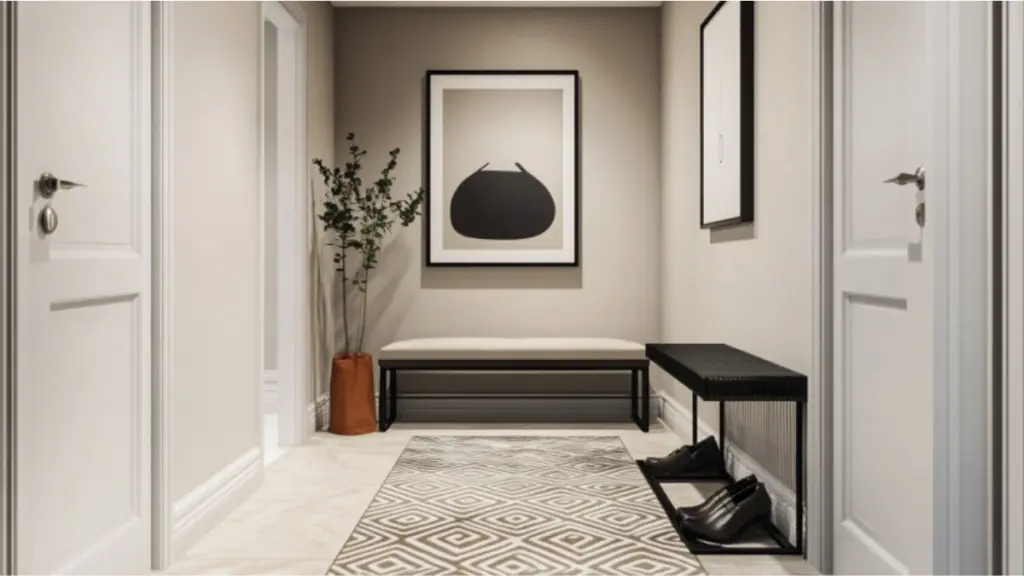
Layering Rugs in Small Entryways
Even in a small footprint, rug layering adds dimension. The trick is keeping it intentional—using layers to define areas without adding bulk.
Layering Tips
| Layer Type | Function | Placement Strategy |
| Base jute rug | Defines space, adds warmth | Choose a neutral base |
| Patterned top rug | Visual focal point | Smaller size, angled for interest |
| Doormat layer | Practical for dirt and moisture | Always on top or beside main rug |
A popular layered look includes a 3’x5’ jute rug beneath a patterned 2’x3’ kilim. This combination offers texture and color without overwhelming the space. It’s also an easy way to refresh seasonally—swap the top rug to update the mood.
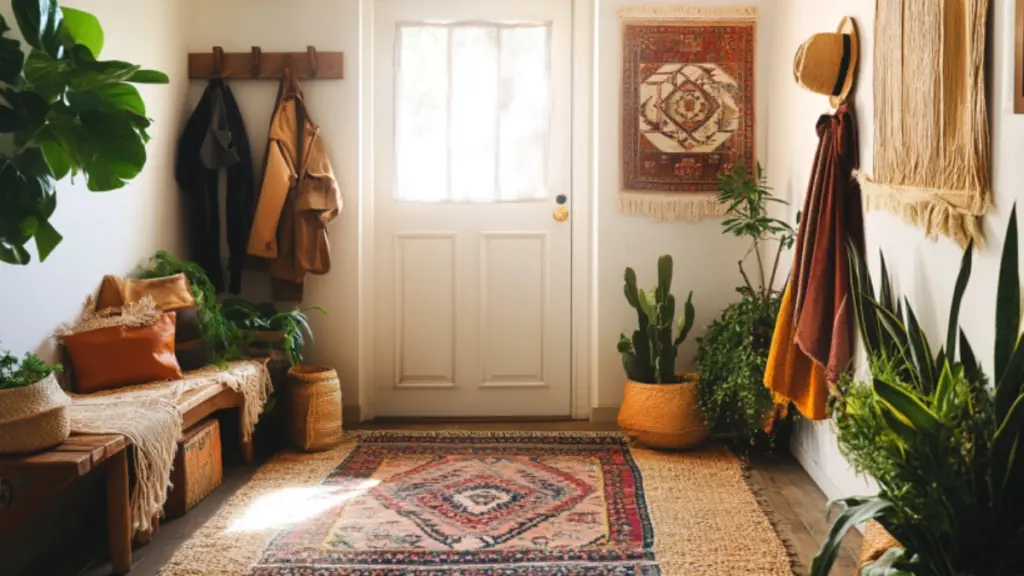
Color Palettes That Complement Entryway Decor
Color is crucial in small spaces. A well-chosen rug palette can make your entryway feel more spacious, brighter, or even more welcoming.
Popular Color Schemes
| Color Scheme | Effect in Small Entryways | Works Well With |
| Neutrals (beige, taupe) | Opens up the space | Scandinavian, farmhouse styles |
| Deep earth tones | Adds warmth and grounding | Rustic, vintage, and traditional decor |
| Black and white | Bold and modern | Contemporary or minimalist aesthetics |
| Pastel tones | Light and playful | Coastal or kids’ entryways |
Neutrals remain the safest bet for resale and versatility. But don’t shy away from darker hues if you want a grounded, dramatic feel—just balance them with light walls or natural light.
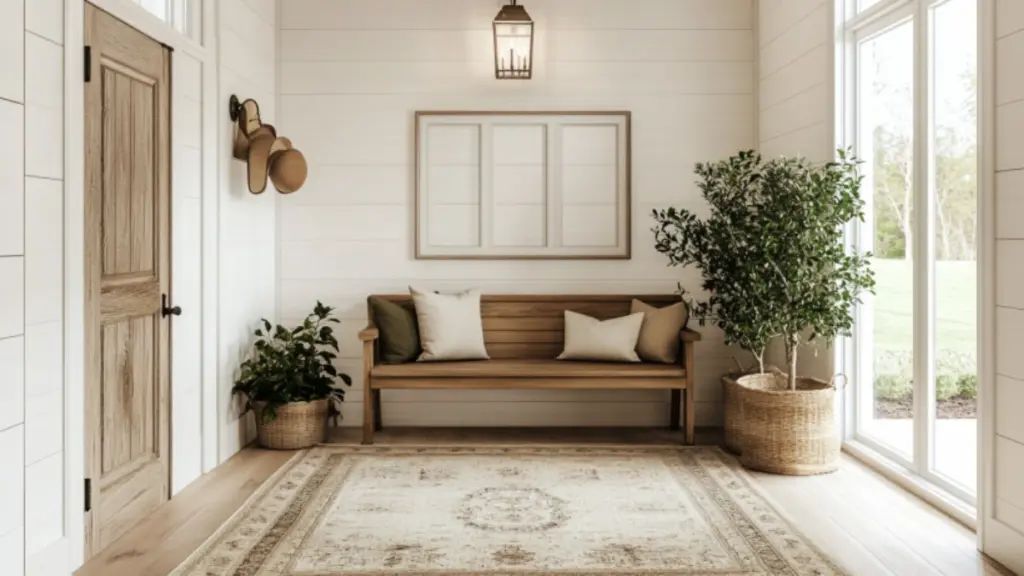
Cleaning and Maintaining Entryway Rugs
Small entryway rugs may be compact, but they pack a big punch in terms of maintenance. With daily foot traffic, outdoor debris, and unpredictable weather, these rugs need regular care to look their best.
Weekly Care Routine
| Task | Frequency | Details |
| Vacuuming | 2–3x a week | Use handheld or narrow vacuum head |
| Spot Cleaning | As needed | Blot with water + mild detergent |
| Shaking Outside | Weekly | Removes loose dirt and debris quickly |
| Rotate Rug | Monthly | Helps wear evenly and preserve appearance |
For deep cleaning, always check the manufacturer’s label. Cotton and synthetic rugs can often be machine washed, while wool and jute require gentle hand cleaning or professional care. Use a rug pad to prevent slippage and absorb some of the stress from heavy usage.
Maintaining the rug not only keeps it looking good but also improves indoor air quality—a big bonus in a small space.
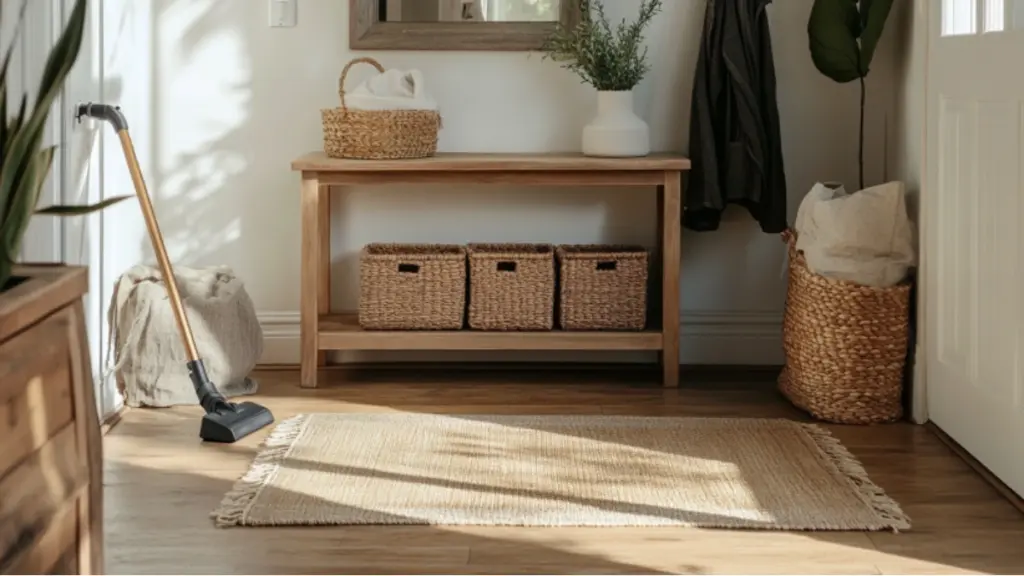
Seasonal Swaps to Refresh Your Entryway
Just like throw pillows or wreaths, rugs can reflect seasonal transitions. A small entryway rug is easy to swap, making it a fun decor update without a full makeover.
Seasonal Rug Ideas
| Season | Rug Style | Color & Texture Suggestions |
| Spring | Lightweight cotton | Pastels, florals, soft stripes |
| Summer | Flatweave or indoor/outdoor | Nautical tones, coastal textures |
| Fall | Textured wool blends | Rust, terracotta, deep neutrals |
| Winter | Plush or layered rugs | Deep blue, charcoal, cozy knits |
Layering is especially useful in colder months. In summer, consider rolling up a heavier rug in favor of a breezy indoor/outdoor mat that’s easy to clean and resistant to humidity.
This rotation not only keeps the look fresh but also extends the life of each rug by reducing year-round wear.
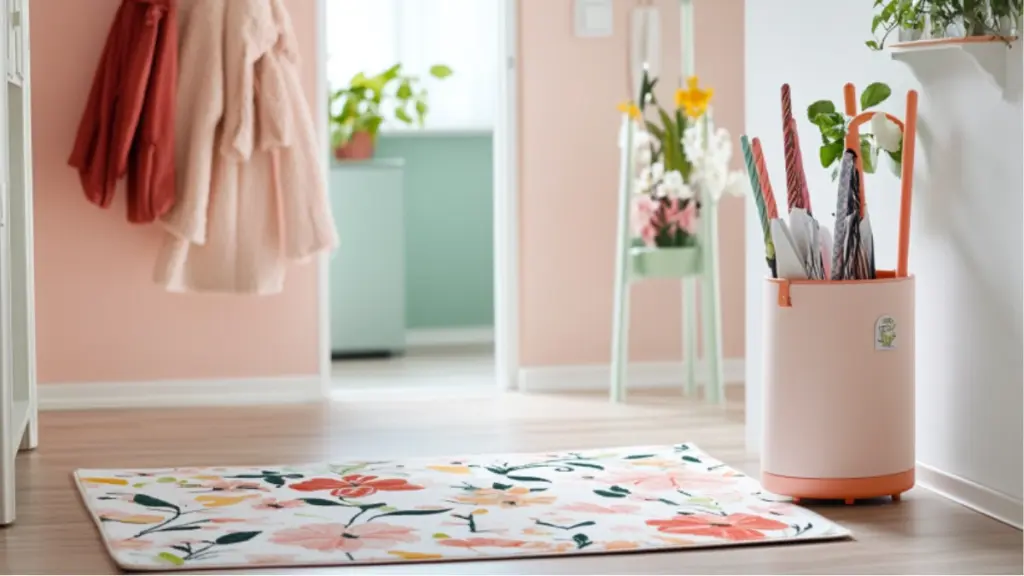
Conclusion
A small entryway may seem like a minor detail in your home, but with the right rug, it becomes a beautifully functional space that welcomes you every day. From selecting the right size and material to choosing patterns, layering styles, and seasonal refreshes, there’s so much potential to express your taste—no matter the square footage. Let your entryway rug do more than cover the floor; let it tell a story of warmth, thoughtfulness, and design intention.

